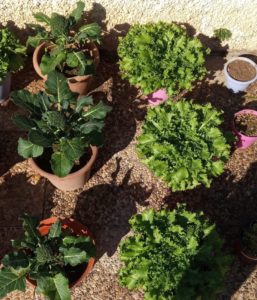During the quarantine, knowing how to make a small urban farm at home can help you not only to grow organic food, but also to entertain and keep your mind also body active. The urban farms do not require a lot of space. If you have a small terrace or balcony where you can put some pots, a cultivation bench or a homemade container as a seedbed, it is more than enough. So lets get down to work:
- We need a bench or planter, space that serves as our farmland. You can prepare it with some pots and soil. Even it is possible to use recycled containers, such as water bottles cut in half (with holes at the bottom). Any container (giant egg cup type) with several holes can serve as a seedbed, although, if you have more space, a terrace with several ‘mini plots’ is more suitable for the crop to have space during growth.

At MAFA, we help you how to make a small urban farm at home during quarantine.
- With the soil bench prepared, your urban garden needs to be fertilized. If you do not have biofertilizers or biostimulants at home, you only need your organic waste, such as eggshells, leftovers of potatoes, vegetables or fruits… To make homemade compost you can:
- Put the organic waste on an even ground base, moisten it and cover it with a plastic so that it ferments.
- Put the waste on a dirt base and cover it with another layer of soil, cover it the container and leave it like that for a week. Later, you can use this compost as fertilizer for your urban garden.
- Once you have reached this point, you need to decide what type of plants you are going to grow in your urban garden. Choose well according to the space you have in your home. If you don’t have it at home, you can find seeds of them online:
- Small plants: radish, carrot, onion, lettuce …
- Large plants: cabbage, eggplant, peppers …
- Vertical plants: tomato, cucumber …
- Place your home garden in a place where there is no direct sunlight. You can put a kind of translucent roof (a plastic can do it) that lets the heat and the sun’s rays through. This way, your plants and your vegetables will grow stronger.
- To water your urban garden efficiently you can use a small plastic bottle filled with water, make holes and sink it from five to ten centimeters. Thus the soil will get drip wet. After planting, you should moisten the soil frequently. The ideal temperature for the vegetables to germinate is between 16 and 25 degrees. If we only have four or five pots, the ideal is to water them manually. With the help of a watering we can avoid soil overflow and loss of nutrients.
The important thing now is to enjoy your house, your plants and new hobbies that perhaps you had not tried before. Lots of good wishes on these days for you and of course always think natural solutions. Your body and mind will thank you.









